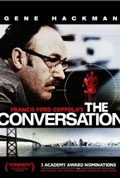
Directed by
Francis Ford Coppola
113 minutes
Rated PG
Reviewed by
Bernard Hemingway

The Conversation
Synopsis: Harry Caul (Gene Hackman) is a freelance security expert who believes that the tapes he has made of a young couple's conversation will lead to them being murdered. Having already been involved in a similar incident he decides to intervene before the worst occurs.
Coppola's film has always rated very highly in critical circles as a standout work of the 70s. Although typifying Zeitgeist concerns with the machinations of Big Brother style organizations, it is less plot or action driven in the contemporary American manner of Sidney Pollack's Three Days Of The Condor (1975) for example and closer to the more "intellectual", analytical approach of a European director like Antonioni, notably in Blow-Up (1968) or the probingly psychological dramas of that distinctively atypical American, John Cassavetes.
Thus whilst the plot of concerns shady goings-on, it's not a thriller so much as a study of an individual (and to a lesser extent a culture) in moral crisis, seeking a secure foothold in a disintegrating world. Hackman, in his long career always a sure bet, has deservedly been praised for portrayal of Harry Caul, the chronically-defensive, insular and alienated surveillance expert, haunted by his unhappy childhood and riven by inner doubt (the closing scene is the memorable denouement of his losing battle). Around him Coppola has assembled a virtual repertory company of players who would appear in other of his films including Terri Garr, Frederic Forrest, John Cazale (whose character, Stanley is a reprise of Freddo in The Godfather of two year's earlier) and Robert Duvall. A very young-looking Harrison Ford also gets a guernsey. They are, however, all figures within Harry Caul's universe (a "caul" is the membrane enclosing a foetus)
Coppola produced, wrote and directed the film so he deserves the accolades ( many have also singled out the Walter Murch sound design). I am not so fulsome in my praise for it, one of the most noticeable issues being the inexplicable shift in character that has Harry invite a lot of seedy industry "colleagues" back to his place of work), but one can admire besides Hackman's performance, Coppola's evocative directorial style.

Want more about this film?


Want something different?




